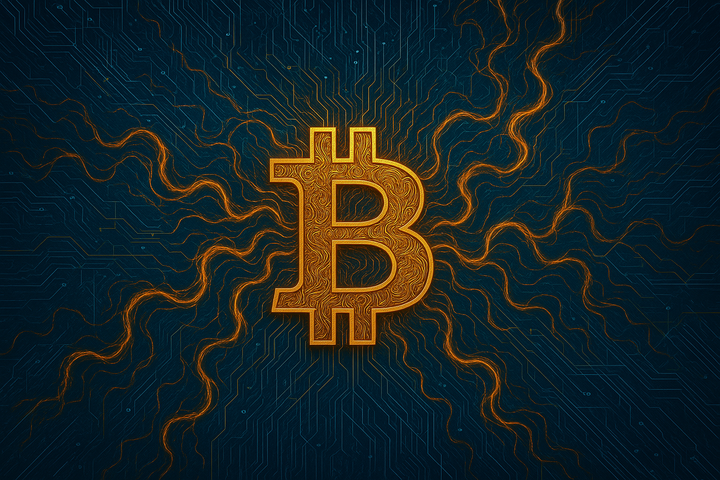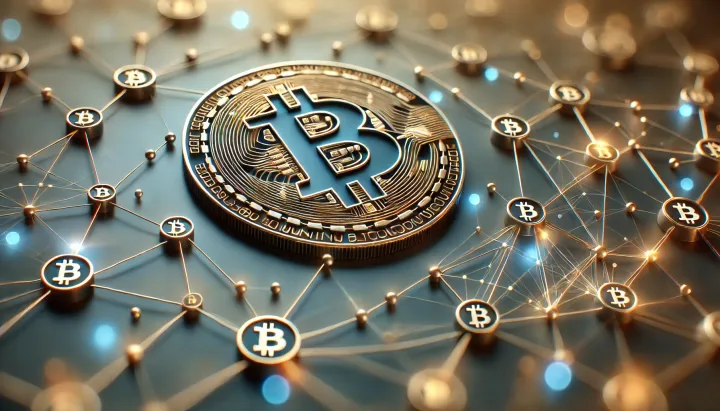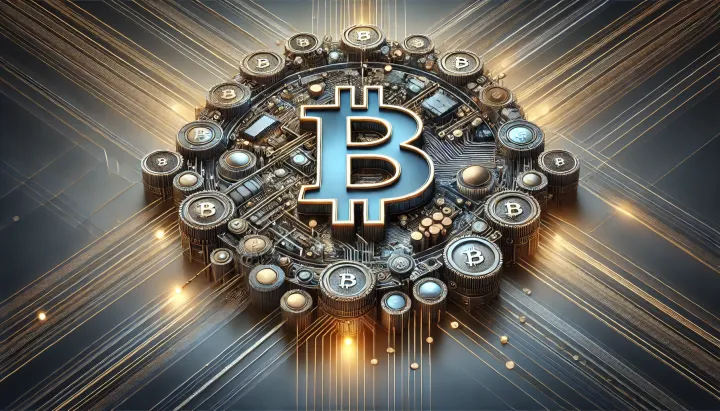God Bless Bitcoin
This briefing note is different than most, summarizing 'God Bless Bitcoin,' a full-length movie. The movie is a comprehensive narrative delivered by Natalie Brunell, exploring the foundational principles and societal implications of Bitcoin.

Summary
The documentary "God Bless Bitcoin," narrated by Natalie Brunell, explores the implications of Bitcoin as a decentralized currency. It argues that Bitcoin offers a viable solution to the problems caused by fiat currency debasement, including economic inequality, inflation, and government overreach. Bitcoin’s fixed supply and decentralized nature make it a potential hedge against hyperinflation and a tool for financial inclusion, particularly in regions with unstable or corrupt monetary systems. The ethical case for Bitcoin is also highlighted, positioning it as a force for global financial justice.
Overview
The narrative of "God Bless Bitcoin" begins with a historical analysis of fiat currency debasement, tracing the origins of economic instability back to President Nixon’s decision to remove the dollar from the gold standard in 1971. This action, aimed at financing the Vietnam War, led to the widespread devaluation of fiat currencies, with the U.S. dollar being a prime example. The broadcast argues that this devaluation has eroded purchasing power and contributed to rising economic inequality.
Bitcoin is presented as a solution to these problems, offering a form of "sound money" that cannot be manipulated by governments or central banks. Unlike fiat currencies, Bitcoin’s supply is capped at 21 million, making it resistant to inflation and hyperinflation. The narrative highlights Bitcoin’s potential as a store of value and a safeguard against the erosion of wealth, particularly in regions prone to economic instability.
The broadcast also contrasts Bitcoin with Central Bank Digital Currencies (CBDCs), which are seen as a potential threat to financial freedom due to the increased government surveillance and control they could enable. Bitcoin, in contrast, is framed as a tool for individual autonomy, allowing users to retain control over their wealth without interference from external authorities.
Further, the broadcast delves into the broader social implications of Bitcoin, emphasizing its potential to promote financial inclusion in underbanked regions. By providing a decentralized and accessible financial system, Bitcoin could empower individuals in regions with corrupt or unstable governments. The ethical dimension of Bitcoin is also explored, with the narrative positioning it as a morally superior alternative to fiat currencies, which are criticized for perpetuating inequality and enabling unethical government practices.
Finally, the broadcast suggests that Bitcoin could play a role in reducing global conflict by limiting governments’ ability to finance wars through currency debasement. By adopting Bitcoin, governments could be forced to operate within their means, potentially leading to a more peaceful and stable global environment.
Stakeholder Perspectives
Who might be interested in these insights and why?
- Industry Leaders: Bitcoin’s potential to disrupt traditional financial systems presents both opportunities and challenges. Companies in the financial sector may need to adapt to a landscape where Bitcoin plays a more prominent role, while technology firms could benefit from increased demand for Bitcoin-related services and infrastructure.
- Policymakers: The rise of Bitcoin poses regulatory challenges, particularly in balancing the need for financial stability with the benefits of decentralization. Policymakers may need to develop frameworks that protect consumers while fostering innovation.
- Regulators: Bitcoin’s decentralized nature presents difficulties for traditional regulatory approaches. Regulators must consider how to enforce compliance without stifling the growth of the Bitcoin ecosystem.
- Investors: Bitcoin offers a hedge against fiat currency devaluation and hyperinflation, making it an attractive investment for those seeking to preserve wealth in uncertain economic times. However, investors must also consider the risks associated with Bitcoin’s volatility and the evolving regulatory environment.
Implications
The film suggests that Bitcoin could significantly reshape the global financial landscape. As a decentralized and finite digital currency, Bitcoin offers a solution to the persistent issue of fiat currency debasement, which has led to inflation and economic inequality. Its resistance to hyperinflation and potential to restore trust in financial systems make it a powerful tool for both individuals and institutions seeking to safeguard their wealth. Additionally, Bitcoin’s ethical positioning as a fair and transparent financial system aligns with global efforts to promote economic justice and reduce corruption. However, the rise of Central Bank Digital Currencies (CBDCs) introduces new challenges, as these state-controlled digital currencies could increase government surveillance and control, undermining financial freedom.
Future Outlook
As the global economic landscape continues to evolve, Bitcoin’s role is expected to grow, especially as concerns about inflation, government overreach, and financial inequality persist. The increasing adoption of Bitcoin by both individuals and institutions could drive significant changes in how value is stored and transferred globally. However, the competition between Bitcoin and CBDCs is likely to intensify, with each representing opposing visions of financial control and autonomy. While Bitcoin advocates argue for its ability to empower individuals and reduce government influence, CBDCs could offer governments unprecedented control over financial systems, leading to potential conflicts in policy and public perception.
Take-Home Messages
- Bitcoin offers a decentralized solution to the problems of fiat currency debasement, providing a hedge against inflation and a tool for financial inclusion.
- The rise of CBDCs poses significant risks to financial freedom, making Bitcoin’s role as an alternative currency more crucial than ever.
- The ethical implications of Bitcoin position it as a force for global financial justice, with the potential to reduce economic inequality and promote peace.
Additional Information
Religious and Ethical Themes
The movie emphasizes the concept of "just money" in Christianity, critiquing fiat currency as unjust due to its role in perpetuating economic inequality and enabling government overreach. It suggests that God would disapprove of the current fiat system, which "steals from the poor and gives to the rich" through inflation and unethical financial practices.
Bitcoin, in contrast, is portrayed as a form of money that aligns with Christian values, promoting fairness, integrity, and transparency. The narrative suggests that Bitcoin could help restore ethical financial practices that honor the teachings of the Bible, particularly the emphasis on stewardship and honesty in financial dealings.
The movie compares the transmission of the Torah in Judaism to the concept of a blockchain, highlighting the idea of a "chain of descent" in religious teachings. This analogy positions Bitcoin's decentralized and immutable ledger as a technological extension of long-standing Jewish traditions of preserving and verifying knowledge.
Additionally, Bitcoin is seen as a tool that aligns with Jewish values of justice, fairness, and the protection of property rights. The narrative suggests that Bitcoin's resistance to confiscation and censorship would have been valuable to Jewish communities historically subjected to persecution and financial exclusion.
The movie delves into the Islamic prohibition of "riba," or interest, and the broader concept of sound money in Islam. It critiques fiat currency for its creation of money without proof of work, which is seen as inherently unjust and contrary to Islamic principles.
Bitcoin is presented as the most Islamic form of money ever invented, as it requires proof of work and cannot be created from nothing. The movie argues that Bitcoin's fixed supply and decentralized nature make it a form of money that is both ethical and in line with the teachings of Islam.
Buddhism is described as a decentralized system, with teachings that encourage individuals to critically analyze and validate beliefs, much like Bitcoin’s consensus mechanism. The narrative aligns the Buddhist emphasis on ethical living and the creation of a kind and fair society with the principles of decentralization and transparency in Bitcoin.
The movie suggests that Bitcoin’s decentralized and non-discriminatory nature is compatible with Buddhist values of equality and compassion, offering a financial system that benefits all beings rather than a select few.
Ethical Implications and Broader Religious Context
Throughout the movie, Bitcoin is framed as a moral and ethical alternative to the current fiat system, which is criticized for perpetuating injustice and inequality. The narrative draws on religious teachings to argue that Bitcoin, by virtue of its transparency, fairness, and resistance to manipulation, embodies ethical principles that are universally recognized across various faiths.
The movie also touches on the idea that Bitcoin can serve as a unifying force across different religious and cultural backgrounds. It emphasizes that Bitcoin is not tied to any specific religion or ideology, making it accessible and beneficial to people of all faiths. This inclusivity is highlighted as one of Bitcoin’s strengths, promoting global financial justice and freedom.
The title "God Bless Bitcoin" and various references throughout the movie suggest a sanctification of Bitcoin as a divine or morally blessed form of money. While the movie does not claim that Bitcoin is a religious entity, it uses religious imagery and symbolism to underscore its ethical and moral legitimacy.
Broadcast details
Source
- Title: God Bless Bitcoin
- Podcast: n/a
- Interviewer: n/a
- Interviewee: Natalie Brunell (narrator)
- Date of Broadcast: 25 July 2024
- Video link:
Kewords
- Fiat currency debasement
- Central Bank Digital Currencies (CBDCs)
- Monetary inflation
- Bitcoin as a store of value
- Financial freedom
- Economic inequality
- Bitcoin's moral case
- Hyperinflation resistance
- Global adoption of Bitcoin
- Decentralization and security
Issues (threats and opportunities)
Fiat Currency Debasement
Fiat currencies are consistently losing value due to inflation, which erodes purchasing power and creates economic instability. This issue is critical as it highlights the unsustainable nature of current monetary policies.
Central Bank Digital Currencies (CBDCs)
The rise of CBDCs poses a threat to individual financial freedom due to increased government surveillance and control. This could lead to greater restrictions on personal autonomy and privacy.
Economic Inequality
The current financial system exacerbates income inequality, concentrating wealth among the elite. Bitcoin is presented as a potential solution to redistribute wealth more equitably.
Hyperinflation Resistance
Bitcoin's fixed supply makes it resistant to hyperinflation, offering a secure store of value in contrast to fiat currencies. This is a significant opportunity for regions prone to economic instability.
Financial Inclusion
Bitcoin enables financial inclusion for individuals in regions with unstable or corrupt financial systems, providing a reliable alternative to traditional banking.
Erosion of Trust in Government and Financial Institutions
As governments and central banks continue to manipulate monetary systems, public trust is eroded. Bitcoin offers a decentralized alternative that could restore trust in financial systems.
Bitcoin’s Role in Reducing War and Conflict
The ability of governments to finance wars through fiat currency debasement is critiqued. Bitcoin’s sound money principles could reduce the incentive for conflict by limiting government spending.
Adoption of Bitcoin by Governments
The potential for governments to adopt Bitcoin as a reserve currency represents both an opportunity for legitimizing Bitcoin and a threat if governments attempt to control its use.
Technological and Educational Barriers
While Bitcoin offers many advantages, technological literacy and access to necessary infrastructure remain barriers to widespread adoption.
The Ethical Case for Bitcoin
Bitcoin is presented as a morally superior form of money that aligns with values of fairness and integrity. This ethical positioning could drive broader adoption among conscientious consumers.
Five Key Research Needs
- In what ways could Bitcoin contribute to reducing income inequality in both developed and developing economies? Understanding Bitcoin's potential to address income inequality is critical, given the current financial system's role in exacerbating this issue. This research could provide insights into how Bitcoin can be used as a tool for economic empowerment, particularly in marginalized communities.
- How effective is Bitcoin as a hedge against hyperinflation in comparison to traditional assets like gold? With growing concerns about hyperinflation in various economies, it is essential to evaluate Bitcoin's efficacy as a protective measure. This research could offer valuable guidance for investors and policymakers in hyperinflationary environments.
- How can Bitcoin be leveraged to enhance financial inclusion in regions with limited access to traditional banking services? Financial inclusion remains a significant global challenge, and Bitcoin presents an opportunity to address it. This research would explore the practical steps needed to ensure that Bitcoin can effectively reach underserved populations.
- What specific privacy concerns arise from the adoption of CBDCs by governments, and how can they be addressed? As CBDCs gain traction, understanding and mitigating privacy risks is paramount. This research would inform the development of policies and technologies to protect individual privacy in a digital currency landscape.
- How does Bitcoin align with ethical principles across different cultures and religions? The ethical case for Bitcoin is a compelling aspect of its adoption. Research in this area would help to bridge cultural and religious divides, promoting broader acceptance of Bitcoin as a tool for financial justice.



Comments ()